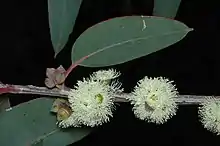Eucalyptus boliviana
Eucalyptus boliviana, commonly known as Bolivia Hill stringybark[2] or Bolivia stringybark[3] is a shrub or a mallee, sometimes a small tree and is endemic to a small area in northern New South Wales. It is a stringybark with four-sides stems, broadly lance-shaped adult leaves, flower buds arranged in groups of seven, yellow flowers and hemispherical to broadly funnel-shaped fruit.
| Bolivia Hill stringybark | |
|---|---|
 | |
| Flowers and buds of Eucalyptus boliviana | |
| Scientific classification | |
| Kingdom: | Plantae |
| Clade: | Tracheophytes |
| Clade: | Angiosperms |
| Clade: | Eudicots |
| Clade: | Rosids |
| Order: | Myrtales |
| Family: | Myrtaceae |
| Genus: | Eucalyptus |
| Species: | E. boliviana |
| Binomial name | |
| Eucalyptus boliviana | |
Description
Eucalyptus boliviana is a shrub or a mallee that grows to a height of 5 metres (16 ft), occasionally a tree that grows to a height of 12 metres (39 ft) high. The bark on the trunk and larger branches is greyish and stringy. The thinner stems are distinctly four sided with wings at each edge. Young plants and coppice regrowth have stems that are square in cross section and leaves that are elliptic to egg-shaped or broadly lance-shaped, 65–110 mm (2.6–4.3 in) long and 30–65 mm (1.2–2.6 in) wide and have a petiole. Adult leaves are broadly lance-shaped, dull bluish green at first then the same glossy green on both sides, 80–160 mm (3.1–6.3 in) long and 30–50 mm (1–2 in) wide with a petiole 12–30 mm (0.5–1 in) long. The flower buds are arranged in groups of seven in leaf axils on a peduncle 4–10 mm (0.2–0.4 in) long but the individual flowers are sessile. Mature buds are oval to broadly spindle-shaped with a conical operculum. Flowering mainly occurs in September and the flowers are yellow. The fruit are sessile, hemispherical to broadly funnel-shaped, 5–6 mm (0.20–0.24 in) long and 10–15 mm (0.39–0.59 in) wide with the valves level with the rim or slightly protruding.[2][3][4][5]
Taxonomy and naming
Eucalyptus boliviana was first formally described in 2001 by John Beaumont Williams and Ken Hill and the description was published in the journal Telopea.[6] The specific epithet (boliviana) refers to this species' occurrence on Bolivia Hill.[5]
Distribution and habitat
Bolivia Hill stringbark is restricted to Bolivia Hill between Glen Innes and Tenterfield where it grows in woodland between granite outcrops.[3][4]
Conservation
This eucalypt is classified as "vulnerable" under the New South Wales Government Biodiversity Conservation Act 2016.[3]
References
- "Eucalyptus boliviana". Australian Plant Census. Retrieved 12 March 2019.
- "Eucalyptus boliviana". Euclid: Centre for Australian National Biodiversity Research. Retrieved 20 March 2019.
- "Bolivia Stringybark - profile". New South Wales Government Office of Environment and Heritage. Retrieved 20 March 2019.
- K.Hill. "New South Wales Flora Online: Eucalyptus boliviana". Royal Botanic Gardens & Domain Trust, Sydney, Australia.
- Williams, John B.; Hill, Kenneth D. (2001). "Eucalyptus boliviana (Myrtaceae), a distinctive new species of stringybark from New England, New South Wales". Telopea. 9 (2): 409–413. doi:10.7751/telopea20013012.
- "Eucalyptus boliviana". APNI. Retrieved 20 March 2019.